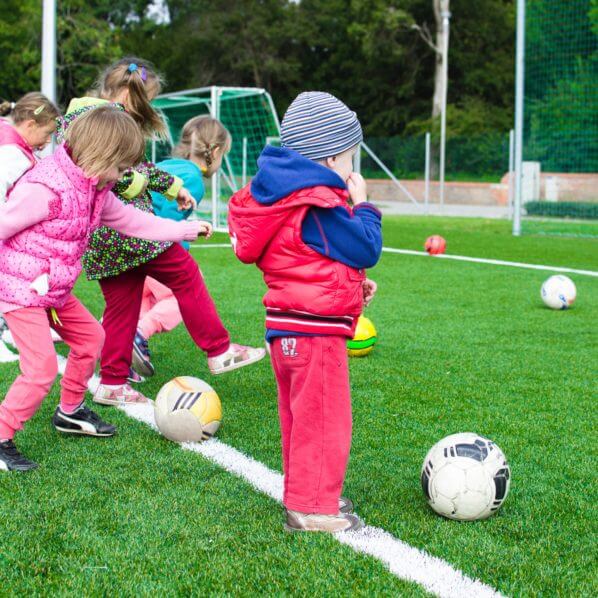BY NEW YORK FAMILY | Sports have always been the go-to when it comes to finding an outlet for your children to unleash their unceasing energy. But it is more than just having them run around and get active. Sports play a key role in building your child’s confidence and set them up for success in the classroom, as well.
However, studies have shown that today’s generation is the least active in history and girls are increasingly dropping out of sports because of some of the many obstacles they confront when it comes to playing the game. We caught up with sports expert Dr. Karen Sutton, who spoke to us about why young girls are dropping out of sports, how we can encourage them to stay involved, and the campaign “Keep Her In The Game,” which helps girls feel strong and confident about getting out there and playing sports!
What is “Keep Her In The Game” all about?
“Keep Her In The Game” is about empowering young girls to stay in sports — either athletically or professionally. I hope that girls will gain an understanding of how sports change during adolescence: the ins and outs of sports bras, deodorant, re-training muscles and managing your period during sports.

Coaches and parents need to understand that younger female athletes respond to a positive tone in coaching, understanding the “why” behind drills, and enjoy a group camaraderie. As a surgeon in a field of 6 percent women, sports gave me the courage and tenacity to feel confident in a typically male profession. Surgery requires diligence, intelligence, ability to multitask and leadership, and I honed these qualities as an athlete throughout my life. Sports empowered me to push myself to succeed in my career and life.
Studies have shown that girls are dropping out of sports at 150 percent the rate that boys do by the age of 14 and 17 years old. Why is this and what are some key factors involved?
A study done by Refinery29 and Gatorade showed that key factors for girls dropping out of sports include social stigma, lack of access, safety and transportation issues, costs and a lack of positive role models. Social stigmas can exist where girls may feel less confident in sports when the spotlight is typically on the male athletes. Additionally, girls have a two-to-eight-times increased risk of anterior cruciate ligament injuries in pivoting and cutting sports. During adolescents there is a weakness in posterior muscles (gluteus medius and hamstrings), which can protect the A.C.L. from injury. Girls are at higher risk for patellofemoral pain syndrome and stress fractures.
How are these studies about girl’s involvement in sports conducted?
Surveying a diverse group of girls ranging from age 8 to 18 and understanding what is limiting their role in sports despite the work of Title IX.
How can we encourage girls to stay in sports?
Create a nurturing environment: It’s important to remember that girls respond to their environment. They prefer a group setting with teams that offer camaraderie, support and friendships. They want to understand the whys behind certain plays or decisions. If a team has a bad practice and the players hang their heads after, having a coach criticize and curse out players will not be well received nor achieve a productive result.

Monitor progress: I like Oprah Winfrey’s approach. Keep a journal of your progress against immediate short- and long-term goals. This applies to sports, academics and your career. With respect to athletics, start by working with the team to come up with a saying that all can rally around. Determine your individual and team goals, then chart how you’re doing — whether it’s more playing time, working hard in practice or enhancing skills. Bring your coach, trainer and teammates into the loop, so all are invested in your goal-setting.
Why is it so important for children to be involved in sports? Aside from health benefits, do these disciplines contribute to their development of life skills?
Being on a team helps girls build confidence in their abilities, meet challenges, overcome adversity and connect the dots between hard work and results. On-field experiences can carry over to the classroom, among friend groups and even into the workplace. A 2017 Ernst & Young survey of high-level female executives found that 90 percent played sports. Among women who held C-suite titles, the proportion was even higher — 96 percent.
The rate of girl’s participation in sports has been dropping. What can we hope to see for the future with girls in sports and what is being done now?
We can hope to see positive role models in sports and careers and that playing sports increases success in the classroom, as well. Communities have to provide positive female role models in coaching and sports leadership roles. Nonprofits, such as Sporty Girls and Girls on the Run, promote sport and physical activities in girls for a healthier generation.
Do you have daughters yourself? Or nieces? If so, how do you as a parent encourage them to take up sports and stick with them?
I have a daughter who is 3 and three sons — 6, 7 and 9 years old — who are very active. My daughter likes to hang with the big boys, play in the backyard, attempt kicking soccer balls, and shooting a basket, etc. I give her developmentally appropriate skills to have fun while trying that out: lower basket, smaller basketball. It’s important to pay attention to developmental milestones. I also give her verbal cues — “Girls are so strong, girls are fast” — and her brothers encourage her, too.
How would you deal with a child who swears to hate a certain sport? How long should a kid stick with an activity before he or she is allowed to quit?
We’re so focused on perfection and drills. Carve out practice time each week for a fun activity. Varsity and travel teams are not the right fit for everyone; consider joining house leagues and participating in intramural sports. And as you mature and your body changes, modify your training to grow as an athlete and enjoy sports.
Dr. Sutton is a board-certified sports medicine surgeon, with surgical expertise in arthroscopy of the shoulder, knee and hip. She is an associate attending orthopedic surgeon at Hospital for Special Surgery and head team physician for United States Women’s Lacrosse. She is also chief medical officer for Federation of International Lacrosse and team physician for US Ski & Snowboard.

















